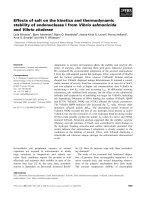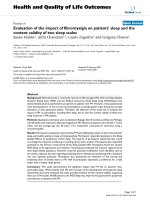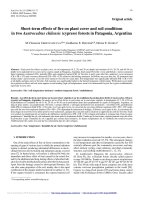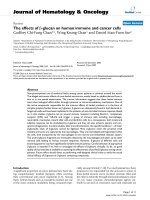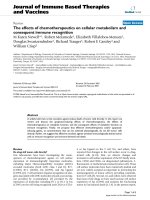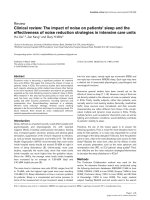Effects of majonoside-R2 on pentobarbital sleep and gastric lesion in psychologically stressed mice
Bạn đang xem bản rút gọn của tài liệu. Xem và tải ngay bản đầy đủ của tài liệu tại đây (696.08 KB, 7 trang )
Pharmacology
Biochemistry and Behavior, Vol. 53, No. 4, pp. 957-%3, 1996
Copyright Lo1996 Elsevier Science Inc.
Printed in the USA. All rights reserved
0091-3057/96$15.00 + .OO
ELSEVIER
SSDIOO91-3057(95)02147-7
Effects of Majonoside-R2 on
Pentobarbital Sleep and Gastric Lesion in
Psychologically Stressed Mice
NGUYEN
THI THU HUONG,*
KINZO MATSUMOTO,*
NGUYEN
MINH DUC,t
NGUYEN
THOI NHAM$ AND
KAZUO
HIROSHI
YAMASAKI,?
WATANABE*’ zyxwvutsrqponmlkjihgfe
*Division of Pharmacology , Research Institute for W akan- Yaku (Oriental M edicines), Toy ama M edical and
Pharmaceutical University , 2630 Sugitani, Toy ama 930- 01, Japan, TDepartment of Biological Active Substances,
Institute of Pharmaceutical Sciences, Hiroshima University School of M edicine, Kasumi l- 2- 3, M nami- ku,
Hiroshima 734, Japan and $ The Science- Production Centre of Vietnamese Ginseng, Ho Chi M inh University of
M edicine and Pharmacy , 41 Dinh tien Hoang, District I, Ho Chi M inh City , Vietnam
Received
3 May 1995; Revised 25 August
1995; Accepted
4 September
1995
HUONG, N. T. T., K. MATSUMOTO, K. YAMASAKI, N. M. DUC, N. T. NHAM AND H. WATANABE. Effects of majonoside-R2 on pentobarbital sleep and gastric lesion in psychologically stressed mice. PHARMACOL BIOCHEM BEHAV 53(4) 957-963, 1996. -The effects of Vietnamese ginseng (VG) and its major constituent majonoside-R2 on
pentobarbital-induced sleep and gastric lesion in psychologically stressed mice were examined. Psychological stress exposure
for 30 min significantly decreased the duration of pentobarbital(50 mg/kg, IP)-induced sleep in mice. VG extract (50 mg/kg,
PO), VG saponin (25 mg/kg, PO), and majonoside-12 (3.1-12.5 mg/kg, PO and IP) had no effect on pentobarbital sleep in
unstressed control mice, but these drugs significantly recovered pentobarbital sleep decreased by psychological stress to the
level of unstressed control animals. On the other hand, Punux ginseng (PG) extract (SO-100 mg/kg, PO) failed to affect
pentobarbital sleep in psychologically stressed mice. The effect of majonoside-R2 on psychological stress-induced decrease in
the hypnotic activity of pentobarbital was significantly blocked by flumazenil (1 mg/kg, IV), a selective benzodiazepine
antagonist. Diazepam (0. I mg/kg, IP) significantly prolonged pentobarbital sleep in unstressed and psychologically stressed
groups, and the effect of diazepam was significantly attenuated by the same dose of flumazenil. Naloxone (0.5-5 mg/kg, IP),
an opioid antagonist, had no effect on pentobarbital sleep in unstressed or psychologically stressed animals. Psychological
stress exposure for 16 h caused gastric lesion in mice. VG extract (25-50 mg/kg, PO) and majonoside-R2 (6.2-12.5 mg/kg,
PO), as well as diazepam and naloxone, produced the protective action on gastric lesion in psychologically stressed mice.
These results suggest that VG and its major constituent majonoside-12 have the protective effects on the psychological
stress-induced pathophysiological changes and that benzodiazepine receptors are partly implicated in the effects of majonoside-R2.
Psychological stress
Pentobarbital-induced
Vietnamese ginseng extract
sleep
Gastric lesion
Vietnamese ginseng total saponin
Majonoside-R2
nervous system have been extensively investigated,
and numbers of studies have demonstrated
the neuromodulatory
action
of PC (33,35,37). Compared with PC, however, few reports
are available on the pharmacological
actions of VG.
Various stressful manipulations
are known to cause pathophysiological
changes in laboratory
animals. For example,
VIETNAMESE
ginseng (VG), as well as Punax ginseng, has
been used as a tonic and/or panacea in Vietnam (24). VG
contains the same saponins as Punux ginseng (PC), but the
major difference between the constituents
of these two ginsengs is that ocotillol-type
saponins such as majonoside-R2
exist in VG but not PG (23). The effects of PG on the central
’ To whom requests for reprints should be addressed.
957
HUONG
958
foot shock, forced swimming
stress, and restraint
stress
change barbiturate-induced
sleep, produce antinociception,
or
cause gastric lesion in rodents (3,7,39). Emotional factors such
as anxiety and fear appear to play an essential role in these
pathophysiological
effects of stressful stimuli (9,12,13,36).
Recently, we found that VG saponin and majonoside-R2
attenuated psychological
stress- and foot shock stress-induced
antinociception
in mice (25). In the present study, we investigated the effects of VG and majonoside-R2
on pentobarbitalinduced sleep and gastric lesion formation in psychologically
stressed mice to further clarify the antistress effect of VG.
ET AL.
30 min in pentobarbital
hypnosis experiments and 1.6 mA, 10
s duration, 110 s intershock interval for 16 h in gastric lesion
experiments) were delivered through the grids by a shock generator (Muromachi-Kikai
Co., Ltd., Tokyo, Japan) according
to the method described by Nomura et al. (26). Thus, only
the mice (sender) in the A compartments
received foot shock
through the grid floor but the animals in the B compartments
(responder) were exposed to psychological stress by watching
and hearing the struggle, jumping, and vocalization of sender
mice in the adjacent compartments.
Preparation of Vietnamese Ginseng Crude Extract, Total
METHODS
Saponin Fraction, M ajonoside-R2, and Panax Ginseng Crude
zyxwvutsrqponmlkjihgfedcbaZYXWVUTSRQPONMLKJIHGFEDCBA
Extract
Animals
Powdered Vietnamese ginseng (Panux vietnamensis Ha et
Male 5-week-old ddY mice (Japan SLC, Shizuoka, Japan)
Grushv. Araliaceae) root and rhizome (5 years old) were exwere zyxwvutsrqponmlkjihgfedcbaZYXWVUTSRQPONMLKJIHGFEDCBA
use d for the experiments.
The animals were housed in
tracted 4 times with 96%, 48%, 24070, and 0% v/v ethanol,
groups of 20-25 per cage for at least 1 week before starting
respectively,
using a percolation
method. The combined exthe experiments.
Housing conditions
were thermostatically
tracts were evaporated under reduced pressure and then lyophmaintained at 24 + 1 ‘C and humidity at 55 i 5%, with a 12
ilized to yield Vietnamese ginseng crude extract (VG extract;
L : 12 D cycle (lights on: 0730-1930 h). Food and water were
yield: 41.2%). Following extraction with ethyl ether to remove
given ad lib. All experiments
were done in compliance with
lipids from the extract, water-saturated
n-butanol was added.
the Guide for Animal Experiments,
Toyama Medical and
The n-butanol extract was then evaporated to dryness to yield
Pharmaceutical
University.
the total saponin fraction (VG saponin; yield: 13.2%). MajoApparatus
The communication
box devised by Ogawa et al. (27) was
used to expose mice to psychological stress (Fig. I). It consists
of 25 compartments
(10 x IO x 40 cm each) with transparent Plexiglas walls and stainless steel grid floor (0.5 cm diameter rods 1 cm apart from each other). Mice were individually
placed in the A and B compartments.
The floor grids of the B
compartments
were covered with Plexiglas plates. Intermittent
electric shocks (1 mA, 1 s duration, 4 s intershock interval for
transparent walls
A
grids
noside-R2 was purified from the fraction as described previously (yield: 5.29%) (23). Panax ginseng crude extract (PC
extract) was prepared from powdered PG root (Tochimoto
Pharm. Co., Ltd., Osaka, Japan) in the same way as described
above (yield: 35.7%).
Pentobarbital- Induced
Sleep
lmmediately after exposing mice to psychological stress for
30 min, 50 mg/kg pentobarbital
sodium (Tokyo Kasei, Co.,
Ltd., Tokyo, Japan) was injected intraperitoneally.
Sleeping
time was taken as the period between the loss of the righting
reflex and its return (22,29).
Psy chological Stress- Induced Gastric Lesion
/
b
The experimental procedure was the same as that described
by Nomura et al. (26). Briefly, mice were fasted for 24 h and
then, randomly divided into two groups (by body weight). The
one was subjected to the psychological stress for 16 h and the
other was placed in each compartment
individually without
being exposed to psychological
stress or foot shock for the
same period as the psychologically
stressed group. The animals were killed by decapitation and their stomachs were rapidly removed and immersed in saline containing 1% formaldehyd e . The gastric mucosa was exposed by cutting along the
greater curvature, washed lightly with saline, and inspected
macroscopically.
The gastric lesion severity was scored according to the criteria reported by Tsukamoto
et al. (38)
(score: 0 = no pathology;
1 = mucosal edema; 2 = petechia; 3 = gross mucosal edema; 4 = severe erosion; 5 = perforated ulcer). The number of animals with gastric lesion score
of more than 2 was also recorded to calculate lesion incidence.
Drug Administration
FIG. I Schematic drawing of the communication box used to expose
mice to psychological stress. Mice were placed individually in each
compartment (A and B). The animals in the A compartments received
foot shock through the grid floor and those in the B compartments
were exposed to psychological stress by watching the behavior or
hearing the vocalization of rhe animals in the A compartments.
VG extract, VG saponin, majonoside-R2,
and PG extract
were dissolved in distilled water and administered
orally (PO)
I h before
stress exposure. In some experiments,
majonoside-R2 or naloxone HCI (Sigma Chem., St. Louis, MO) was
dissolved in saline and injected intraperitoneally
(IP) 30 min
and IO min before stress exposure, respectively.
Diazepam
(Cercine@, Takeda Chemical Industries Ltd., Osaka, Japan)
EFFECT
OF MAJONOSIDE-R2
959
induced decrease in pentobarbital sleep, F(2, 136) = 2.265,
was dissolved in saline containing 40% propylene glycol, and
p = 0.108. A two-way ANOVA revealed significant effect of
administered PO 1 h before stress exposure or injected IP 30
diazepam treatment on pentobarbital sleep in unstressed and
min before stress exposure. Flumazenil (Anexate@, Roche Co.
psychologically stressed animals, F(3, 95) = 49.288, p <
Ltd., Basel) was injected IV (into tail vein) just before stress
0.01, and pentobarbital sleep in 0.1 and 0.5 mg/kg diazepamexposure. All drugs were administered in a constant volume
treated groups were significantly longer than that in vehicle
of 0.1 ml/10 g body weight. zyxwvutsrqponmlkjihgfedcbaZYXWVUTSRQPONMLKJIHGFEDCBA
treated group. On the other hand, significant naloxone x
stress interaction was observed, F(3, 105) = 3.281, p < 0.05,
Statistical Analy sis
but the effect of naloxone (0.5-5 mg/kg, IP) treatment was
Gastric lesion incidence and lesion severity were analyzed
not statistically significant, F(3, 105) = 1.044, p = 0.376
with Fisher’s Exact probability test and Kruskal-Wallis analy(Table 2).
sis of variance (ANOVA) followed by Dunn’s test, respectiveA two-way ANOVA revealed a significant diazepam x fluly. The duration of pentobarbital-induced
sleep was analyzed
mazenil interaction, F(1, 80) = 15.114, p < 0.01, and a sigwith two-way or three-way ANOVA followed by Tukey’s test
nificant majonoside-R2 x flumazenil interaction, F( 1, 83) =
for multiple comparison among groups. Differences were con7.003, p < 0.051 (Fig. 2). Flumazenil (1 mg/kg, IV) by itself
sidered statistically significant at p < 0.05.
had no effect on pentobarbital
sleep but it significantly
blocked the effects of diazepam (0.1 mg/kg, IP) and majonoRESULTS
side-R2 (3.1 mg/kg, IP) on the pentobarbital sleep decreased
by psychological stress. A three-way ANOVA revealed a sigEffects of VG Extract, VG Saponin, and M ajonoside- R2 on
nificant stress exposure x majonoside-R2 x flumazenil inPsy chological Stress- Induced Decrease in Pentobarbital
teraction, F(1, 83) = 6.319, p < 0.05, but no significant
Sleeping Time
stress exposure x diazepam x flumazenil interaction, F(1,
As summarized in Table 1, psychological stress exposure
80) = 0.396,~ > 0.05.
for 30 min significantly decreased the duration of pentobarbital sleep in mice. VG extract (50 mg/kg, PO), VG saponin (25
Effects of VG Extract and M ajonoside- R2 on the
mg/kg, PO), or majonoside-R2 (3.1, 6.2, and 12.5 mg/kg,
Psy chological Stress- Induced Gastric Lesion
PO or IP) had no effect on the pentobarbital-induced
sleep in
unstressed control mice, but they significantly recovered the
Psychological stress exposure for 16 h significantly inhypnotic activity of pentobarbital decreased by psychological
creased the gastric lesion incidence (76.9 and 17.5%, in
stress to the level of unstressed control mice. PG extract (50
stressed and unstressed mice, respectively) and gastric lesion
and 100 mg/kg) failed to recover the psychological stressseverity (Table 3). Pretreatment with VG extract (25 and 50
TABLE 1
EFFECTS OF VG EXTRACT,
VG SAPONIN,
AND ITS MAJOR CONSTITUENT
ON PSYCHOLOGICAL
STRESS-INDUCED
DECREASE
IN THE HYPNOTIC
PENTOBARBITAL
IN MICE
MAJONOSIDE-R2
ACTIVITY OF
Sleeping Time (min)
Drugs
Experiment
I
Vehicle
VG extract
PC extract
Experiment
II
Vehicle
VG saponin
Majonoside-R2
Experiment
III
Vehicle
Majonoside-R2
DO%
(w/kg)
Unstressed
Stressed
73.0
65.4
70.3
77.7
76.7
64.3
z!X1.9
i 3.0
f 4.5
f 6.3
f 3.6
+ 4.5
56.2
56.5
79.5
72.0
65.2
65.8
i
zk
*
k
-t
+
2.3*
3.1
5.31
4.3
4.3
3.5
12.5
25
6.2
12.5
70.2
68.9
75.5
73.4
76.4
k
+
+
+
+
1.6
2.6
4.0
2.0
4.0
56.9
65.0
71.3
80.0
69.9
t
t
*
+
+
1.9*
2.8
4.71
6.3$
4.08
3.1
6.2
12.5
73.1
71.6
66.9
74.5
f
k
k
*
2.9
3.7
2.8
4.3
58.3
80.7
72.2
74.6
+
f
k
f
2.2t
4.2$
1.59
4.1s
25
50
100
50
100
Interaction Between Stress and Drug
F(3, 169) = 5.696,~
< 0.01
F(2, 136) = 4.693,~
< 0.05
F(2, 118) = 4.064,~
< 0.05
F(2, 118) = 4.105,~
< 0.05
F(3, 101) = 5.523,~
< 0.01
Mice were divided into two groups and only the one group was exposed to psychological
stress for 30
min. Test drugs were administered
PO I h before stress exposure except for Experiment III. In Experiment
III, majonoside-R2
was injected IP 30 min before stress exposure. Each datum represents the mean f
SEM of 12-15 mice. *p < 0.01 and tP < 0.05 compared with respective unstressed group. $p < 0.01 and
$p < 0.05 compared with respective vehicle treatment (Tukey’s test).
HUONG
960
ET AL.
TABLE 2
EFFECTS OF DIAZEPAM AND NALOXONh
ON THE DECRtASE IN THE HYPNOTIC
OF PENTOBARBITAL
BY PSYCHOLOGICAL
STRESS IN MICE
ACTIVITY
Interaction Bet\rren Stress and Drug
Drug5
Experiment
Vehicle
Diarepam
I
Experiment
Vehicle
Naloxone
II
70.4
68.4
90.9
141.5
0.05
0.10
0.50
73.5
67.8
71.0
69.5
0.5
I .o
5.0
_+ 2.3
i 3.0
+ 2.W
+ 15.7+
i
I
k
i
57.4
68.4
78.6
118.7
3.4
3.5
2.9
3.9
55.x
68.6
69.1
66.0
r
+
t
t
2.1*
2.1
5.9t
9.ot
&3, 95) = 1.289, p > 0.05
2.7:
f 3.0
i 2.6
+ 2.9
r
p(3, 105) = 3.281,~
< 0.05
Mice were divided into two groups and only the one group was exposed to psychological
stress for 30
min. Diazepam and naloxone were injected IP 30 min and 10 min before stress exposure, respectively. In
(3, 95) = 49.288, p < 0.01. fq\;,,,,,(l, 95) = 8.679, p < 0.01. In Experiment
Experiment
L J’L~,,~,~ ,re.l:mCI,,
(3, 105) = 1.044, p > 0.05, IC\,,,,,( I, 105) = 6.234, p < 0.05. Each datum represents the
II, zyxwvutsrqponmlkjihgfedcbaZYXWVUTSRQPONMLKJIHGFEDCBA
F.Ildltn
mean i SEM of IO-18 mice. *p < 0.01 compared
with unstressed group. tp < 0.01 compared
with
vehicle treatment.
mg/kg) and majonoside-R2
(6.2 and 12.5 mg/kg) significantly
reduced the incidence and severity of gastric lesion in psychologically stressed mice without affecting these parameters
in
unstressed control animals. The reference drugs diazepam (10
mg/kg, PO) and naloxone (5 mg/kg, IP) also showed the
protective actions on the psychological
stress-induced
gastric
lesion, while PC extract (50 mg/kg) exhibited no statistically
significant protective effect on the gastric lesion.
DISCUSSIONS
In the present study, VG and its major component majonoside-R2 showed the protective effects on the psychological
stress-induced
gastric lesion, and recovered the stress-induced
decrease in the hypnotic activity of pentobarbital
to the norma1 level, whereas PG extract had no effect on these pathophysiological changes.
Unstressed groups
I
Psychologically stressed groups
Flumazenil
-
-
1
-
1
-
-
l-l
Diazepam
-
-
0.1
0.1
-
-
-
-
0.1
0.1
-
-
Majonoside-R2
-
-
-
-
3.1
3.1
-
-
-
-
3.1
3.1
1
mg/ks
FIG. 2. Effects of diazepam and majonoside-R2
on psychological
stress-induced
decrease of pentobarbital sleep and antagonistic
action of flumazenil on the effects of diazepam and majonoside-R2.
Diazepam
or majonoside-R2
was administered
IP 30 min before stress exposure. Flumazenil was injected IV just
before stress exposure. The unstressed animals were treated with test drugs in the same way as the stressed
mice. Each value is the mean + SEM of 12 mice. *p < 0.05 and **p < 0.01 compared with the respective
vehicle control groups, ##p < 0.01 compared with the corresponding
nonflumazenil
groups and $p <
0.05 compared with the corresponding
unstressed groups (Tukey’s test).
EFFECT
OF MAJONOSIDE-R2
961
TABLE 3 zyxwvutsrqponmlkjihgfedcbaZYXWVUTSRQPONMLKJIHGF
EFFECTS
OF VG EXTRACT,
VG SAPONIN,
PSYCHOLOGICAL
STRESS-INDUCED
AND MAJONOSIDE-R2
GASTRIC LESION
ON
Lesion Severity
Lesion Incidence
DOW
Drugs
Vehicle
VG extract
Majonoside-R2
PG extract
Naloxone
Diazepam
(m/ kg)
25
50
6.2
12.5
50
5
10
Unstressed
Stressed
Unstressed
7/40
l/12
l/14
3/14
l/12
l/l4
3/14
3/14
30/39*
l/12$
3/14$
l/13$
2/12$
7/14*
2/14$
4/12$
1.4
1.1
1.1
2.1
1.1
1.1
1.8
1.9
+
*
*
*
f
*
f
f
0.2
0.4
0.4
0.4
0.4
0.3
0.6
0.4
Stressed
3.5
1.3
1.8
0.9
1.5
2.3
2.0
1.8
+
*
+
f
f
+
f
+
0.37
0.3$
0.45
0.3$
0.4$
0.5
0.48
0.58
Mice were divided into two groups and only the one group was exposed to psychological stress for 16 h
as described in the text. Gastric lesion incidence was expressed as the ratio of the number of animals with
lesion score of > 2 to the number of animals used. Lesion severity was expressed as the mean score f SEM
of 12-14 mice. Test drugs except naloxone were administered PO 1 h before stress exposure. Naloxone was
injected IP 10 min before stress exposure. $p < 0.01 and Qr < 0.05 compared with the vehicle treatment.
*p < 0.05 and tp < 0.01 compared with the corresponding unstressed group. Lesion incidence and lesion
severity were analyzed with Fisher Exact probability test and Kruskal-Wallis test followed by Dunn’s test,
respectively.
Although Vietnamese ginseng contains the same ginsenoand majonoside-R2 recovered the hypnotic activity of pentosides (ginsenoside-Rbl , zyxwvutsrqponmlkjihgfedcbaZYXWVUTSRQPONMLKJIHGFEDCBA
-Rgl , -Rd, and -Re) as Punax zyxwvutsrqponmlkjihgfedcbaZYXWVUTSRQPONMLKJIHGFEDCBA
ginseng,
barbital decreased by psychological stress to the level of unnew saponin compounds
and ocotillol-type
saponins,
espestressed control mice and that the effect of majonoside-R2
cially majonoside-R2,
have been isolated from the Vietnamese
was significantly blocked by flumazenil. Exact mechanisms
ginseng saponin fraction but not from Panax ginseng saponin
fraction (23). Thus, these differences between the chemical
compositions of Vietnamese ginseng and Panax ginseng may
explain the action profiles of Vietnamese
ginseng differing
from those of Punux ginseng. The present finding that majo-
noside-R2, as well as Vietnamese ginseng saponin, attenuated
the pathophysiological effects of psychological stress supports
this idea, and gives further evidence that majonoside-R2 plays
an important role in the effects of Vietnamese ginseng (25).
Psychological stimuli such as noise, fear, anxiety, etc., increase arousal level and cause insomnia in humans (21). In
experimental animals, increasing evidence suggests that various kinds of stressful stimuli induce changes in the hypnotic
activities of barbiturates (3,22,34,39). Opiatergic, dopaminergic, and GABAergic systems appear to be involved in these
pathophysiological changes following stress exposure (1,4,6,
14). The previous report from this laboratory (22) demonstrated that repeated application of forced shaking stress at
low temperature decreased the hypnotic action of pentobarbital in mice and that diazepam attenuated the stress-induced
decrease of pentobarbital sleep through benzodiazepine receptors, suggesting that functional changes in GABA, receptor
systems participate in the decrease of pentobarbital sleep by
forced shaking stress. In the present study, psychological
stress exposure for 30 min also significantly decreased the
duration of pentobarbital sleep in mice. Although diazepam
significantly prolonged pentobarbital sleep in unstressed and
psychologically stress mice and the effect of diazepam was
significantly attenuated by flumazenil, no significant stress
exposure x diazepam x flumazenil was observed. Thus, the
contribution of GABA, systems to the psychological stressinduced decrease in pentobarbital sleep may be not so large as
that to the forced shaking stress-induced decrease of pentobarbital sleep (22).
It is of interest to note that the VG extract, VG saponin,
underlying this apparent antagonistic interaction between majonoside-R2 and flumazenil in psychologically stressed mice
remain unclear, but these findings suggest that benzodiazepine
receptors participate partly in the action of majonoside-R2.
Opioid systems also appear to be involved in the pathologic
states induced by stressful stimuli since naloxone, an opioid
receptor antagonist, modulates the stress responses of the animal (5,28). In our previous study (25), both VG saponin and
majonoside-R2, as well as naloxone, suppressed the psychological stress-induced antinociception
in mice in a dosedependent manner, suggesting possible involvement of opioid
receptor mechanisms in the effects of VG saponin and majonoside-R2. Taken together, functional changes in opioid systems caused by psychological stress exposure may participate
in the effect of Vietnam ginseng on pentobarbital sleep in
psychologically stressed mice. However, such a possibility
seems to be little, if any, because naloxone produced no statistically significant action on pentobarbital sleep in unstressed
or psychologically stressed mice.
The central nervous system and the brain-gut axis have
been suggested to play important roles in stress-induced gastric ulceration (8,11,20,31). In this study, both naloxone and
diazepam significantly reduced the gastric lesion incidence and
lesion severity in mice exposed to psychological stress for 16
h. Although controversial data have been reported regarding
the roles of central opioid systems in the stress gastric ulceration (7,18), the present results suggest possible involvement
of opioid and GABA, systems in the psychological stressinduced gastric lesion in mice. As well as these reference
drugs, VG extract, VG saponin, and majonoside-R2 showed
protective effects on gastric lesion caused by psychological
stress. Taking into account the possible roles of GABA, systems in mediating the effects of VG and majonoside-R2 on
pentobarbital sleep in psychologically stressed mice, it is quite
interesting to speculate that GABA, systems are partially im-
HUONG ET AL.
962
plicated in the protective effect of majonoside-R2 on the psychological stress-induced gastric lesion. To clarify the exact
mechanisms underlying the protective effects of majonoside-R2 on the pathophysiological changes caused by psychological stress will require further investigations.
In conclusion, Vietnam ginseng produces protective effects
on pathophysiological changes following the psychological
stress exposure in mice. Majonoside-R2, one of the major
saponin constituents of Vietnamese ginseng, may play an important role in the effect of Vietnamese ginseng. zyxwvutsrqponmlkjihgf
ACKNOWLEDGEMENTS
This study was in part supported by the Fujisawa Foundation,
Osaka. The authors gratefully
acknowledge
Dr. Shoji Shibata, an
emeritus professor of Tokyo University and Dr. Osamu Tanaka, an
emeritus professor of Hiroshima University, for their encouragement.
REFERENCES
1 Biggio, G.; Concas, A.; Corda, M. G.; Giorgi, 0.; Sanna, E.;
19. Losada, M. E. 0. Acute stress and GABAergic function in the rat
Serra, M. GABAergic and dopaminergic
transmission
in the rat
brain. Br. J. Pharmacol.
96:507-512;
1989.
20 Mahl, G. F. Anxiety, HCI secretion, and peptic ulcer etiology.
cerebral cortex: Effect of stress, anxiolytic and anxiogenic drugs.
Pharmacol.
Ther. 48:121-142;
1990.
Psychosom.
Med. 12:158-169; 1950.
2. Buckingham,
21 Martin, J. B. The sleep-wake
C. J.; Cooper, A. T. Effects of naloxone on hypocycle and disorders of sleep. In:
thalamo-pituitary-adrenocortical
activity in the rat. NeuroendoPetersdorf,
R. G.; Adams, R. D.; Braunwald,
E.; Isselbacher, K.
crinology 42:421-426;
1986.
J.; Martin, J. B.; Wilson, J. D., eds. Harrison’s
principles of
3. Carmody, J. Effects of electric foot shock on barbiturate
international
medicine. 10th ed. New York: McGraw-Hill
Book
sensitivity, nociception
and body temperature
in mice. Eur. J. PharmaCompany;
1983:118-124.
22. Matsumoto,
col. 89:119-123;
1983.
K.; Satoh, T.; Li, H. B.; Ohta, H.; Watanabe,
H.
4. Corda, M. G.; Biggio, G. Stress and GABAergic
transmission:
Effects of forced shaking stress at low temperature
on pentobarBiochemical
and behavioral
studies. In: Biggio, G.; Costa, E.,
bital-induced
sleeping in mice. Gen. Pharmacol.
22:729-733;
eds. GABAergic
transmission
and anxiety. New York: Raven
1991.
Press; 1986:121-136.
23. Nguyen, M. D.; Kasai, R.; Ohtani, K.; Ito, A.; Nguyen, T. N.;
5. Dai, S.; Chan, M. Y. Effects of naloxone on serum corticosterone
Yamasaki,
K.; Tanaka, 0. Saponins from Vietnamese ginseng,
and gastric lesions in stressed rats. Pharmacology
27:180-184;
Panax vietnamensis Ha et Grushv. Collected in Central Vietnam.
1983.
III. Chem. Pharm. Bull. 42:634-640;
1994.
M. C.; Pichiri, M.; Muntoni,
24. Nguyen, T. N.; et al. Study on Panax vietnamensis Ha et Grushv.
6. Fratta, W.; Collu, M.; Martellotta,
F.; Gessa, G. L. Stress-induced
insomnia: Opioid-dopamine
inAraliaceae.
Botany-Tissue
culture-Chemistry-Biological
properteractions. Eur. J. Pharmacol.
142:437-440;
1987.
ties. Herba Polon. 35(Suppl. 11):24: 1989.
25. Nguyen, T. T. H.; Matsumoto,
K.; Nguyen, M. D.; Yamasaki,
7. Glavin, B. G. Effects of morphine
and naloxone on restraintstress ulcers in rats. Pharmacology
31:57-60; 1985.
K.; Nguyen, T. N.; Watanabe,
H. Vietnamese ginseng crude sa8. Glavin, G. B.; Murison, R.; Overmier, J. B.; Pare, W. P.; Bakke,
ponin and its major component majonoside-R2
attenuate the psyH. K.; Henke, P. G.; Hernandez,
D. E. The neurobiology
of
chological stress- and foot shock stress-induced
antinociception
stress ulcers. Brain Res. Rev. 16:301-343; 1991.
in mice. Pharmacol.
Biochem. Behav. 52:427-432; 1995.
9. Hamon,
M. Neuropharmacology
of anxiety: Perspectives
and
I. A mecha26. Nomura, K.; Maeda, N.; Yoshino, T.; Yamaguchi,
prospects. Trends Pharmacol.
Sci. 15:36-39; 1994.
nism of 5-HT, receptor mediation is involved etiologically
in the
10. Hanada,
psychological
stress lesion in the stomach of the mouse. J. PharS.; Deguchi, Y.; Kaneto. H. Diversity of underlying
mechanisms
in the production
of analgesic and pentobarbitalmacol. Exp. Ther. 271:lOO-106; 1994.
hypnosis
prolonging
effects of various
analgesic
drugs and
27. Ogawa,
N.; Hara, C.; Ishikawa,
M. Characteristic
of sociostresses. Jpn. J. Pharmacol.
39:117-119;
1985.
psychological
stress induced by the communication
box method
11. Hernandez,
D. E. Neuroendocrine
mechanisms
of stress ulcerin mice and rats. In: Mannine,
O., ed. Environmental
stress.
ation: Focus on thyrotropin-releasing
hormone (TRH). Life Sci.
Tampere: ACES Publishina Ltd.: 1990:417-427.
39~219-296; 1986.
28. Ohdo, S.; Yoshimura,
H.;-Ogawa,
N. Alteration in hypnotic efY.; Moriyama,
M.; Gomita,
Y. Gastric lesions pro12. Ichimaru,
fect of pentobarbital
following repeated agonistic confrontations
in mice. Psychopharmacology
(Berlin) 97:30-34; 1989.
duced by conditioned
emotional stimuli in the form of affective
communication
and effects of benzodiazepines.
Life Sci. 34: 18729. Ojima, K.; Matsumoto,
K.; Tohda, M.; Watanabe,
H. Hyperactivity of central noradrenergic
and CRF systems is involved in
192; 1984.
13. Ichimaru, Y .; Gomita, Y. A new screening method for anti-ulcer
social isolation-induced
decrease in pentobarbital
sleep. Brain
Res. 684:87-94; 1995.
agents: Psychological
stress produced
by intraspecies
emotional
communication.
Pharmacology
34:176-180;
1987.
30. Olsen, R. W. GABA-benzodiazepine-barbiturate
receptor inter14. Iimori, K.; Tanaka,
actions. J. Neurochem.
37:1-13; 1981.
M.; Kohno, Y.; Ida, Y .; Nakazawa,
R.;
Hoaki, Y.; Tsuda, A.; Nagasaki,
N. Psychological
stress en31. Puri, S.; Ray, A.; Chakravarti,
A. K.; Sen, P. A. A differential
hances noradrenaline
turnover in specific brain regions in rats.
dopamine receptor involvement during stress ulcer formation
in
Pharmacol.
Biochem. Behav. 16:637-640; 1982.
rats. Pharmacol.
Biochem. Behav. 47:749-752;
1994.
15. Inglefield,
32. Rovati, L. C.; Sacerdote, P.; Fumagalli,
P.; Bianchi, M.; ManR. J.; Kellogg, K. C. Hypothalamic
GABA, receptor
blockade modulates
cerebral cortical systems sensitive to acute
tegazza, P.; Panerai, A. E. Benzodiazepines
and their antagonists
stressors. Psychopharmacology
(Berlin) 116:339-345;
1994.
interfere with opioid-dependent
stress-induced
analgesia.-Phar16. Ishikawa,
M.; Ohdo, S.; Watanabe,
H.; Hara, C.; Ogawa, N.
macol. Biochem. Behav. 36:123-126;
1990.
33. Saito, H.; Tsuchiya, M.; Naka, S.;.Takagi,
Alteration
in circadian rhythm of plasma corticosterone
in rats
K. Effect of Punux
following sociopsychological
stress induced by communication
ginseng root on acquisition
of sound discrimination
behavior in
box. Physiol. Behav. 57:41-47; 1995.
rat. Jpn. J. Pharmacol.
29:319- 325; 1977.
17. Kim, Y. C.; Lee, J. H.; Kim, M. S.; Lee, N. Cl. Effect of the
34. Shibasaki, T.; Imaki, T.; Hotta, M.; Ling, N.; Demura, H. Psysaponin
fraction
of zyxwvutsrqponmlkjihgfedcbaZYXWVUTSRQPONMLKJIHGFEDCBA
Panux ginseng on catecholamines
in the
chological
stress increases arousal through brain corticotropinmouse brain. Arch. Pharmacol.
Res. 8:45-49; 1985.
releasing
hormone
without significant
increase in adrenocor18. Kleiman-Wexler,
R. L.; Ephgrave, K. S.; Adair, C. G. Naloxone
ticotropin
and catecholamine
secretion.
Brain Res. 618:71-75;
and restraint stress: Effects on gastric mucosal injury and gastric
1993.
35. Takahashi,
function. Pharmacotherapy
12:61-67; 1992.
M.; Tokuyama,
S.; Kaneto, H. Antistress effect of
EFFECT
OF MAJONOSIDE-R2
ginseng on the inhibition of the development of morphine tolerance in stressed mice. Jpn. J. Pharmacol. 59:399-404; 1992.
36. Tokuyama, S.; Takahashi, M.; Kaneto, H. Participation of
GABAergic systems in the production of antinociception by various stresses in mice. Jpn. J. Pharmacol. 60:105-110; 1992.
37. Tsang, D.; Yeung, H. W.; Tso, W. W.; Peck, H.; Lay, W. P.
Effect of saponins isolated from ginseng on the uptake of neurotransmitter in rat brain synaptosomes. Neurosci. Lett. Suppl. 12:
S20; 1983.
38. Tsukamoto, Y.; Nakazawa, S.; Segawa, K.; Taminaga, J.; Chu-
963
joh, C. Gastric mucosal damage of rats in hypoxemia. In: Umehara, S.; Ito, H., eds. Advances in experimental ulcers. The 4th
International Conference for Experimental Ulcer (ICEU); 1981:
129-135.
39. Willow, M.; Carmody, J.; Carroll, P. The effect of swimming in
mice on pain perception and sleeping time in response to hypnotic
drugs. Life Sci. 26:219- 224; 1980.
40. Yoneda, Y.; Kanmori, K.; Ida, S.; Kuriyama, K. Stress-induced
alterations in metabolism of y-aminobutyric acid in rat brain. J.
Neurochem. 40:350-356; 1983.

